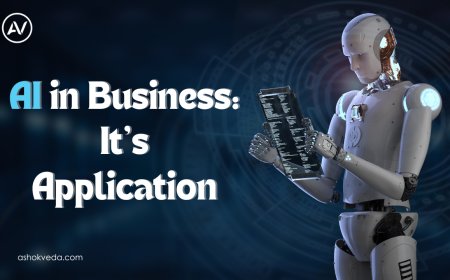The Role Of AI for Social Good
Discover AI's impact on social good, solutions, innovation, community, ethics, sustainability, health, education, equality, environment, and technology.

AI for social good is a game-changer when it comes to tackling important societal problems and driving positive transformations. With the help of data analysis and machine learning, AI brings about groundbreaking solutions in different fields, such as healthcare, education, and the environment. These advancements aim to provide fair and equal opportunities for everyone, ensuring that no one is left behind. By leveraging AI, we can create a world that is more interconnected and fair, where technology is used to uplift communities and enable them to thrive. It is crucial to emphasize the ethical and responsible use of AI, making sure that its benefits are accessible to all. This approach paves the way for a future that is inclusive and sustainable, where AI plays a pivotal role in shaping a better world for everyone.
Challenges in Adopting AI Solutions: Many organizations, including NGOs, non-profits, and governmental agencies, face limited financial resources and technical expertise, hindering their ability to effectively implement AI solutions. Additionally, ethical considerations such as data privacy, algorithmic biases, and potential societal implications must be balanced with the benefits of AI. Organizations must also ensure the security of vast amounts of data and address any biases present in AI algorithms. Furthermore, preparing for and mitigating the societal implications of AI adoption, adhering to evolving regulations, and ensuring long-term sustainability are all complex tasks. Resistance to change within organizations can also pose a challenge to AI adoption.
How can individuals contribute to AI for social good?
People can make a positive impact on AI for the betterment of society by actively participating in its development, implementation, and regulation.
Here are some ways individuals can contribute:
1. Education and Awareness: One of the key ways to make a positive impact on AI is by educating oneself and others about its potential benefits and risks. This includes understanding the underlying technologies, ethical considerations, and potential societal impacts. By raising awareness, individuals can engage in informed discussions and contribute to shaping AI policies and regulations.
2. Ethical AI Development: Individuals can actively participate in the development of AI systems with a focus on ethical considerations. This involves ensuring fairness, transparency, and accountability in AI algorithms and decision-making processes. By advocating for ethical practices, individuals can help prevent biases, discrimination, and other negative impacts of AI on society.
3. Collaboration and Interdisciplinary Approach: AI development requires collaboration across various disciplines. Individuals can contribute by working in interdisciplinary teams, bringing together expertise from computer science, ethics, psychology, sociology, and law. This collaboration helps ensure a holistic approach to AI development, considering both technical and societal aspects.
4. Social Impact Projects: Engaging in AI projects that have a positive social impact is another way to contribute. This could involve developing AI applications that address societal challenges, such as healthcare, education, climate change, or poverty. By leveraging AI for social good, individuals can make a tangible difference in people's lives.
5. Policy and Regulation: Active participation in policy-making and regulation is crucial to ensure AI is developed and deployed responsibly. Individuals can contribute by engaging with policymakers, providing input on AI-related legislation, and advocating for policies that prioritize public interest, privacy, and safety.
What skills are essential in this domain?
1. Technical Expertise: A strong foundation in computer science, machine learning, and data science is essential to understanding the technical aspects of AI development. This includes knowledge of programming languages, algorithms, statistical modelling, and data analysis.
2. Ethical Awareness: Understanding the ethical implications of AI is crucial. Individuals need to be aware of biases, fairness, privacy concerns, and the potential impact of AI on society. This requires knowledge of ethical frameworks, and legal regulations, and the ability to analyse AI systems critically.
3. Communication and Collaboration: Effective communication skills are necessary to engage in interdisciplinary teams, convey complex ideas to non-technical stakeholders, and advocate for ethical AI practices. Collaboration skills are also important to work effectively with diverse teams and stakeholders.
4. Problem-Solving and Critical Thinking: AI development often involves
AI has proven to be a valuable tool in various fields, including healthcare, disaster management, and sustainability. By leveraging AI, healthcare services can be optimized, natural disasters can be managed more efficiently, and sustainability can be promoted. These impactful AI applications have the potential to lead to positive social outcomes, making AI an important technology for the betterment of society.
Key skills needed in this field include:
Successful AI integration strategies: Implementing AI for social good necessitates community involvement, transparent data practices, and continuous evaluation of AI's impact on society.
Capacity Building and Training Programs: Establish capacity-building initiatives and training programs to equip individuals with the necessary skills for AI utilization, fostering a culture of innovation and continuous learning.
Interdisciplinary Collaboration: Encourage interdisciplinary collaboration among professionals from various fields, such as technology, social sciences, and humanities, to ensure holistic problem-solving and comprehensive AI application development.
Local Context Adaptation: Customize AI solutions according to the specific needs and contexts of local communities, considering cultural, linguistic, and socioeconomic factors to ensure effective and sustainable implementation.
Sustainable Infrastructure Development: Invest in building robust and sustainable AI infrastructure, including data storage, processing capabilities, and connectivity, to support the deployment and scalability of AI solutions in diverse communities.
Regulatory Framework Establishment: Develop comprehensive regulatory frameworks and policies to govern AI implementation, ensuring adherence to ethical standards, data protection laws, and privacy regulations, thereby promoting responsible AI development and usage.
AI for social good offers exciting opportunities to address important societal issues. By encouraging collaboration across different fields, prioritizing ethical considerations, and actively involving communities, individuals and organizations can leverage the potential of AI to make positive impacts on a global scale. This approach enables the development of sustainable solutions that promote inclusivity and social well-being. It is crucial to integrate AI responsibly and transparently in order to build trust and maximize its benefits for diverse communities. This will ensure equal access to essential services and contribute to overall societal progress. By aligning AI initiatives with community needs and ethical standards, we can effectively utilize technology to tackle urgent challenges and create a fairer and more sustainable future for everyone.





































